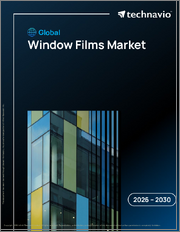
|
시장보고서
상품코드
1679281
윈도우 필름 시장 예측(-2030년) : 유형별, 소재별, 기술별, 용도별, 최종사용자별, 지역별 세계 분석Window Film Market Forecasts to 2030 - Global Analysis By Type, Material, Technology, Application, End User and By Geography |
||||||
Stratistics MRC에 따르면 세계의 윈도우 필름 시장은 2024년에 22억 달러를 차지하며 예측 기간 중 CAGR은 8.0%로 성장하며, 2030년에는 35억 달러에 달할 전망입니다.
윈도우 필름은 자동차, 주택, 건물의 유리면에 붙이는 얇은 라미네이트 코팅입니다. 보통 폴리에스테르 또는 이와 유사한 플라스틱으로 만들어지며, 투명, 착색, 반사 등 다양한 유형이 있습니다. 이 필름은 자외선을 차단하고, 실내를 퇴색으로부터 보호하고, 태양열 상승을 억제하고, 냉방 비용을 절감하고, 부서진 유리를 이어붙여 부상이나 침입의 위험을 줄여 보안을 강화하고, 프라이버시를 위해 자연광을 차단하지 않고 공간의 시야를 제한하여 프라이버시를 보호할 수 있습니다. 패턴이나 색상, 무광택 마감으로 미적 매력을 더하는 등 다양한 목적을 달성합니다. 또한 패턴이나 색상, 무광택 마감으로 미관을 연출할 수도 있습니다. 윈도우 필름은 이러한 장점을 제공함으로써 다양한 상황에서 에너지 효율, 안전, 프라이버시, 미관에 기여합니다.
오토케어 협회에 따르면 미국에 기반을 둔 독립 제조업체, 부품점, 수리점, 판매업체 수는 50만 개가 넘습니다. 자동차 보호 필름에 대한 수요는 사고 증가, 직사광선에 의한 피부 손상 가능성 등으로 인해 증가하고 있습니다.
에너지 효율에 대한 의식의 향상와 에너지 소비 절감의 필요성 대두
에너지 비용이 계속 상승함에 따라 주거 및 상업용 건물 소유주들은 에너지 소비를 최소화하고 유틸리티 비용을 절감할 수 있는 솔루션을 찾고 있습니다. 윈도우 필름은 창문을 통한 열 획득과 열 손실을 줄여 전반적인 에너지 효율을 높이는 효과적인 수단이 될 수 있습니다. 또한 지속가능성과 녹색 건물에 대한 관심이 높아지면서 에너지 효율이 높은 윈도우 필름의 채택이 증가하고 있습니다. 태양열 제어 및 단열 특성과 같은 스마트 기술이 윈도우 필름에 통합되면서 시장에서의 매력이 더욱 커지고 있습니다.
내구성 및 유지보수 문제
윈도우 필름은 많은 장점이 있지만 자외선 노출, 온도 변화, 부적절한 시공 등의 요인으로 인해 수명과 성능이 손상될 수 있습니다. 시간이 지남에 따라 윈도우 필름은 열화, 벗겨지거나 변색되어 효과가 떨어지고 교체해야 할 필요가 있습니다. 또한 윈도우 필름의 외관과 기능을 유지하기 위해서는 정기적인 청소와 유지보수가 필요하며, 이는 부동산 소유주에게 번거로운 작업입니다. 또한 윈도우 필름이 장기적인 투자가 아닌 단기적인 해결책이라는 인식도 시장 성장을 저해하는 요인으로 작용할 수 있습니다.
자외선 차단에 대한 관심 증가
자외선(UV)에 장시간 노출되면 피부에 손상을 입히고 노화를 촉진하며 피부암의 위험을 증가시킬 수 있습니다. 자외선 차단 기능이 있는 윈도우 필름은 유해한 자외선으로부터 거주자를 보호할 수 있으며, 주거용, 상업용 및 자동차 용도에서 매력적인 선택이 될 수 있습니다. 자외선 노출과 관련된 건강 위험에 대한 인식이 높아지면서 우수한 자외선 차단 기능을 제공하는 윈도우 필름에 대한 수요가 증가하여 시장 성장을 가속하고 있습니다.
자동차 색채에 대한 엄격한 규제
여러 국가와 지역에서는 운전자의 안전과 가시성을 보장하기 위해 자동차 창문에 허용되는 착색 수준을 규정하는 특정 규정이 있습니다. 이러한 규정을 위반할 경우 벌금이나 벌칙이 부과되며, 위반된 윈도우 필름을 제거하거나 교체해야 합니다. 시장마다 다른 색조 규정의 차이는 제조업체와 유통업체에 어려움을 초래하고 일관된 제품을 제공하는 능력에 영향을 미쳐 윈도우 필름 시장의 성장을 더욱 제한할 수 있습니다.
COVID-19의 영향
윈도우 필름 시장은 COVID-19의 발생으로 인해 다양한 영향을 받고 있습니다. 한편으로는 건강과 안전에 대한 관심이 높아지면서 항균성과 셀프 클리닝 기능을 갖춘 윈도우 필름에 대한 수요가 급증했습니다. 또한 에너지 효율과 자외선 차단을 목적으로 한 주거용 윈도우 필름도 팬데믹으로 인한 원격 근무와 주택 개조 작업의 급증으로 인해 인기가 높아지고 있습니다. 그러나 시장은 공급망 중단과 경제 불확실성으로 인한 어려움에 직면하고 있으며, 이는 제조 및 유통 운영에 영향을 미치고 있습니다.
예측 기간 중 프라이버시 필름 분야가 가장 클 것으로 예상됩니다.
프라이버시 필름은 자연광을 통과시키면서 외부의 가시성을 차단할 수 있으므로 사무실, 욕실, 매장 등의 용도에 적합하며, 예측 기간 중 프라이버시 필름 분야가 가장 큰 시장 점유율을 차지할 것으로 예상됩니다. 인구 밀도가 높은 도시 지역의 프라이버시 보호 솔루션에 대한 수요 증가와 개방형 사무실 공간의 추세는 프라이버시 보호 필름의 채택을 촉진하고 시장 성장을 가속하고 있습니다.
예측 기간 중 전기 변색 및 열 변색 부문은 가장 높은 CAGR을 보일 것으로 예상됩니다.
예측 기간 중 전기 변색 및 열 변색 부문이 가장 높은 성장률을 보일 것으로 예상됩니다. 이러한 첨단 윈도우 필름은 편안함, 에너지 절약, 눈부심 감소, 다양한 용도에 적합하며, 다양한 용도로 사용할 수 있습니다. 스마트 빌딩과 에너지 효율이 높은 솔루션에 대한 관심이 높아지면서 윈도우 필름 시장의 성장을 가속하고 있습니다.
가장 큰 점유율을 차지하는 지역:
예측 기간 중 북미가 가장 큰 시장 점유율을 차지할 것으로 예상되는데, 이는 주요 시장 기업의 존재와 R&D에 대한 막대한 투자로 인해 북미의 윈도우 필름 시장에서의 입지를 더욱 공고히 하고 있기 때문입니다. 또한 녹색 건축 기준 증가와 상업용 건물 및 주거용 건물에서 에너지 효율이 높은 솔루션에 대한 수요가 증가함에 따라 이 지역 시장 지배력을 지원하고 있습니다. 또한 스마트홈 및 스마트 오피스 동향 증가는 북미의 첨단 윈도우 필름 수요를 견인하고 있습니다.
CAGR이 가장 높은 지역:
예측 기간 중 아시아태평양은 가장 높은 CAGR을 보일 것으로 예상됩니다. 이는 에너지 효율적인 건축 관행을 촉진하기 위한 정부의 구상과 인프라 개발에 대한 투자 증가가 이 지역의 높은 성장률에 기여하고 있기 때문입니다. 중국, 인도, 일본과 같은 국가들은 대규모 프로젝트와 지원 정책을 시행하고 있으며, 윈도우 필름 채택의 최전선에 있습니다. 자동차 산업의 확대, 자외선 차단 및 에너지 절약에 대한 인식 증가는 아시아태평양에서 시장 확대의 큰 기회를 더욱 창출하고 있습니다.
무료 커스터마이징 서비스
이 보고서를 구독하는 고객은 다음과 같은 무료 맞춤화 옵션 중 하나를 이용할 수 있습니다.
- 기업소개
- 추가 시장 기업의 종합적 프로파일링(최대 3사)
- 주요 기업의 SWOT 분석(최대 3사)
- 지역 세분화
- 고객의 관심에 따른 주요 국가별 시장 추정, 예측, CAGR(주: 타당성 확인에 따라 다름)
- 경쟁사 벤치마킹
- 제품 포트폴리오, 지역적 입지, 전략적 제휴에 기반한 주요 기업의 벤치마킹
목차
제1장 개요
제2장 서문
- 개요
- 이해관계자
- 조사 범위
- 조사 방법
- 데이터 마이닝
- 데이터 분석
- 데이터 검증
- 조사 어프로치
- 조사 정보원
- 1차 조사 정보원
- 2차 조사 정보원
- 전제조건
제3장 시장 동향 분석
- 촉진요인
- 억제요인
- 기회
- 위협
- 기술 분석
- 용도 분석
- 최종사용자 분석
- 신흥 시장
- COVID-19의 영향
제4장 Porter's Five Forces 분석
- 공급 기업의 교섭력
- 바이어의 교섭력
- 대체품의 위협
- 신규 진출업체의 위협
- 경쟁 기업 간 경쟁 관계
제5장 세계의 윈도우 필름 시장 : 유형별
- 솔라 컨트롤 필름
- 보안과 안전 필름
- 장식 필름
- 프라이버시 필름
- 단열 필름
- 낙서 방지 필름
- 기타 유형
제6장 세계의 윈도우 필름 시장 : 소재별
- 비닐
- 폴리에스테르
- 플라스틱
- 세라믹
- 기타 자료
제7장 세계의 윈도우 필름 시장 : 기술별
- 염색
- 금속화
- Low-E(저방사율) 코팅
- 일렉트로크로믹 & 서모크로믹
- 라미네이션
- 기타 테크놀러지
제8장 세계의 윈도우 필름 시장 : 용도별
- 일사 제어와 자외선 보호
- 프라이버시
- 안전과 보안
- 미학
- 기타 용도
제9장 세계의 윈도우 필름 시장 : 최종사용자별
- 자동차
- 건축·건설
- 해양·항공우주
- 기타 최종사용자
제10장 세계의 윈도우 필름 시장 : 지역별
- 북미
- 미국
- 캐나다
- 멕시코
- 유럽
- 독일
- 영국
- 이탈리아
- 프랑스
- 스페인
- 기타 유럽
- 아시아태평양
- 일본
- 중국
- 인도
- 호주
- 뉴질랜드
- 한국
- 기타 아시아태평양
- 남미
- 아르헨티나
- 브라질
- 칠레
- 기타 남미
- 중동 및 아프리카
- 사우디아라비아
- 아랍에미리트
- 카타르
- 남아프리카공화국
- 기타 중동 및 아프리카
제11장 주요 발전
- 계약, 파트너십, 협업, 합병사업
- 인수와 합병
- 신제품 발매
- 사업 확대
- 기타 주요 전략
제12장 기업 프로파일링
- 3M
- American Standard Window Film
- Armolan Window Films
- Avery Dennison Corporation
- Eastman Chemical Company
- Garware Suncontrol
- Hanita Coatings RCA Ltd
- Hyosung Chemical
- Johnson Window Films, Inc
- Lintec Corporation
- Madico, Inc
- Nexfil
- Rayno Window Film
- Reflectiv Window Films
- Saint-Gobain Performance Plastics Corporation
- Toray Plastics Inc
According to Stratistics MRC, the Global Window Film Market is accounted for $2.2 billion in 2024 and is expected to reach $3.5 billion by 2030 growing at a CAGR of 8.0% during the forecast period. Window film is a thin laminate coating applied to glass surfaces in vehicles, homes, and buildings. Typically made from polyester or similar plastics, it comes in various types including transparent, tinted, and reflective. These films serve multiple purposes: reducing solar heat gain and cooling costs while blocking UV rays and protecting interiors from fading; enhancing security by holding shattered glass together to reduce the risk of injury or intrusion; limiting visibility into spaces without obstructing natural light for privacy; and adding aesthetic appeal with patterns, colors, or frosted finishes. By offering these benefits, window films contribute to energy efficiency, safety, privacy, and aesthetics in various settings.
According to the Auto Care Association, there have been more than 500,000 independent U.S.-based manufacturers, part stores, repair shops, and distributors. The demand for automotive protective films is increasing due to a rise in accidents, potential skin damage from direct sunlight.
Market Dynamics:
Driver:
Increasing awareness of energy efficiency and the need to reduce energy consumption
As energy costs continue to rise, both residential and commercial property owners are seeking solutions to minimize energy use and lower utility bills. Window films provide an effective means of reducing heat gain and heat loss through windows, thereby enhancing overall energy efficiency. Additionally, the growing emphasis on sustainability and green building practices is driving the adoption of energy-efficient window films. The integration of smart technology into window films, such as solar control and thermal insulation properties, further enhances their appeal in the market.
Restraint:
Durability and maintenance issues
Window films offer numerous benefits; their longevity and performance can be compromised by factors such as UV exposure, temperature fluctuations, and improper installation. Over time, window films may deteriorate, peel, or discolor, leading to reduced effectiveness and the need for replacement. Additionally, maintaining the appearance and functionality of window films requires regular cleaning and upkeep, which can be cumbersome for property owners. The perception of window films as a short-term solution rather than a long-lasting investment can also hinder market growth.
Opportunity:
Rising concerns about UV protection
Prolonged exposure to ultraviolet (UV) rays can cause skin damage, premature aging, and increase the risk of skin cancer. Window films with UV-blocking properties can protect occupants from harmful UV radiation, making them an attractive option for residential, commercial, and automotive applications. The growing awareness of the health risks associated with UV exposure is driving demand for window films that offer superior UV protection propelling the market growth.
Threat:
Stringent regulations on automotive tinting
Various countries and regions have specific regulations governing the allowable tint levels on vehicle windows to ensure safety and visibility for drivers. Non-compliance with these regulations can result in fines, penalties, and the need to remove or replace non-compliant window films. The variability of tinting regulations across different markets can create challenges for manufacturers and distributors, impacting their ability to provide consistent products further constrain the growth of the window film market.
Covid-19 Impact
The market for window film has been affected by the COVID-19 outbreak in a variety of ways. On the one hand, demand for window films with antimicrobial and self-cleaning qualities has surged due to the growing emphasis on health and safety. Residential window films for energy efficiency and UV protection have also become more popular as a result of the pandemic's surge in remote work and home renovation initiatives. However, the market has faced difficulties due to supply chain interruptions and economic uncertainty, which have affected manufacturing and distribution operations.
The privacy film segment is expected to be the largest during the forecast period
The privacy film segment is expected to account for the largest market share during the forecast period because these films can obscure visibility from the outside while allowing natural light to pass through, making them ideal for applications in offices, bathrooms, and storefronts. The increasing demand for privacy solutions in densely populated urban areas and the growing trend of open-concept office spaces are driving the adoption of privacy films encouraging the growth of the market.
The electrochromic & thermochromic segment is expected to have the highest CAGR during the forecast period
Over the forecast period, the electrochromic & thermochromic segment is predicted to witness the highest growth rate as they offer dynamic and responsive light control by changing their tint level based on external stimuli such as temperature and voltage. These advanced window films provide enhanced comfort, energy savings, and glare reduction, making them suitable for a wide range of applications. The growing focus on smart buildings and energy-efficient solutions is driving the adoption of window film market.
Region with largest share:
During the forecast period, the North America region is expected to hold the largest market share attributed to the presence of major market players and significant investments in research and development further strengthen North America's position in the Window Film market. The increasing adoption of green building standards and the rising demand for energy-efficient solutions in commercial and residential buildings also support the region's market dominance. Additionally, the growing trend of smart homes and smart offices drives the demand for advanced window films in North America.
Region with highest CAGR:
Over the forecast period, the Asia Pacific region is anticipated to exhibit the highest CAGR owing to government initiatives promoting energy-efficient building practices and the rising investments in infrastructure development contribute to the high growth rate in this region. Countries like China, India, and Japan are at the forefront of window film adoption, with large-scale projects and supportive policies in place. The expanding automotive industry and the growing awareness of UV protection and energy savings further create substantial opportunities for market expansion in the Asia Pacific region.
Key players in the market
Some of the key players in Window Film market include 3M, American Standard Window Film, Armolan Window Films, Avery Dennison Corporation, Eastman Chemical Company, Garware Suncontrol, Hanita Coatings RCA Ltd, Hyosung Chemical, Johnson Window Films, Inc, Lintec Corporation, Madico, Inc, Nexfil, Rayno Window Film, Reflectiv Window Films, Saint-Gobain Performance Plastics Corporation and Toray Plastics Inc.
Key Developments:
In February 2025, Saint-Gobain has completed the acquisition announced of FOSROC, a leading global construction chemicals player with a strong geographic footprint in India, the Middle East and Asia-Pacific in particular.
In January 2025, Eastman introduced the latest innovation in its sustainable fiber portfolio today at Heimtextil trade fair in Frankfurt, Germany. Eastman Naia(TM) Renew cellulosic fiber for fill applications expands beyond the brand's success in bedding and towels.
In December 2024, 3M and US Conec Ltd. announced a strategic licensing agreement for 3M(TM) Expanded Beam Optical Interconnect technology; a solution to meet the performance and scalability needs of next-generation data centers and advanced network architectures.
Types Covered:
- Solar Control Film
- Security & Safety Film
- Decorative Film
- Privacy Film
- Insulating/Low-E Film
- Anti-Graffiti Film
- Other Types
Materials Covered:
- Vinyl
- Polyester
- Plastic
- Ceramic
- Other Materials
Technologies Covered:
- Dyeing
- Metallizing
- Low-E (Low Emissivity) Coating
- Electrochromic & Thermochromic
- Lamination
- Other Technologies
Applications Covered:
- Solar Control & UV Protection
- Privacy
- Safety & Security
- Aesthetics
- Other Applications
End Users Covered:
- Automotive
- Building & Construction
- Marine & Aerospace
- Other End Users
Regions Covered:
- North America
- US
- Canada
- Mexico
- Europe
- Germany
- UK
- Italy
- France
- Spain
- Rest of Europe
- Asia Pacific
- Japan
- China
- India
- Australia
- New Zealand
- South Korea
- Rest of Asia Pacific
- South America
- Argentina
- Brazil
- Chile
- Rest of South America
- Middle East & Africa
- Saudi Arabia
- UAE
- Qatar
- South Africa
- Rest of Middle East & Africa
What our report offers:
- Market share assessments for the regional and country-level segments
- Strategic recommendations for the new entrants
- Covers Market data for the years 2022, 2023, 2024, 2026, and 2030
- Market Trends (Drivers, Constraints, Opportunities, Threats, Challenges, Investment Opportunities, and recommendations)
- Strategic recommendations in key business segments based on the market estimations
- Competitive landscaping mapping the key common trends
- Company profiling with detailed strategies, financials, and recent developments
- Supply chain trends mapping the latest technological advancements
Free Customization Offerings:
All the customers of this report will be entitled to receive one of the following free customization options:
- Company Profiling
- Comprehensive profiling of additional market players (up to 3)
- SWOT Analysis of key players (up to 3)
- Regional Segmentation
- Market estimations, Forecasts and CAGR of any prominent country as per the client's interest (Note: Depends on feasibility check)
- Competitive Benchmarking
- Benchmarking of key players based on product portfolio, geographical presence, and strategic alliances
Table of Contents
1 Executive Summary
2 Preface
- 2.1 Abstract
- 2.2 Stake Holders
- 2.3 Research Scope
- 2.4 Research Methodology
- 2.4.1 Data Mining
- 2.4.2 Data Analysis
- 2.4.3 Data Validation
- 2.4.4 Research Approach
- 2.5 Research Sources
- 2.5.1 Primary Research Sources
- 2.5.2 Secondary Research Sources
- 2.5.3 Assumptions
3 Market Trend Analysis
- 3.1 Introduction
- 3.2 Drivers
- 3.3 Restraints
- 3.4 Opportunities
- 3.5 Threats
- 3.6 Technology Analysis
- 3.7 Application Analysis
- 3.8 End User Analysis
- 3.9 Emerging Markets
- 3.10 Impact of Covid-19
4 Porters Five Force Analysis
- 4.1 Bargaining power of suppliers
- 4.2 Bargaining power of buyers
- 4.3 Threat of substitutes
- 4.4 Threat of new entrants
- 4.5 Competitive rivalry
5 Global Window Film Market, By Type
- 5.1 Introduction
- 5.2 Solar Control Film
- 5.3 Security & Safety Film
- 5.4 Decorative Film
- 5.5 Privacy Film
- 5.6 Insulating/Low-E Film
- 5.7 Anti-Graffiti Film
- 5.8 Other Types
6 Global Window Film Market, By Material
- 6.1 Introduction
- 6.2 Vinyl
- 6.3 Polyester
- 6.4 Plastic
- 6.5 Ceramic
- 6.6 Other Materials
7 Global Window Film Market, By Technology
- 7.1 Introduction
- 7.2 Dyeing
- 7.3 Metallizing
- 7.4 Low-E (Low Emissivity) Coating
- 7.5 Electrochromic & Thermochromic
- 7.6 Lamination
- 7.7 Other Technologies
8 Global Window Film Market, By Application
- 8.1 Introduction
- 8.2 Solar Control & UV Protection
- 8.3 Privacy
- 8.4 Safety & Security
- 8.5 Aesthetics
- 8.6 Other Applications
9 Global Window Film Market, By End User
- 9.1 Introduction
- 9.2 Automotive
- 9.3 Building & Construction
- 9.4 Marine & Aerospace
- 9.5 Other End Users
10 Global Window Film Market, By Geography
- 10.1 Introduction
- 10.2 North America
- 10.2.1 US
- 10.2.2 Canada
- 10.2.3 Mexico
- 10.3 Europe
- 10.3.1 Germany
- 10.3.2 UK
- 10.3.3 Italy
- 10.3.4 France
- 10.3.5 Spain
- 10.3.6 Rest of Europe
- 10.4 Asia Pacific
- 10.4.1 Japan
- 10.4.2 China
- 10.4.3 India
- 10.4.4 Australia
- 10.4.5 New Zealand
- 10.4.6 South Korea
- 10.4.7 Rest of Asia Pacific
- 10.5 South America
- 10.5.1 Argentina
- 10.5.2 Brazil
- 10.5.3 Chile
- 10.5.4 Rest of South America
- 10.6 Middle East & Africa
- 10.6.1 Saudi Arabia
- 10.6.2 UAE
- 10.6.3 Qatar
- 10.6.4 South Africa
- 10.6.5 Rest of Middle East & Africa
11 Key Developments
- 11.1 Agreements, Partnerships, Collaborations and Joint Ventures
- 11.2 Acquisitions & Mergers
- 11.3 New Product Launch
- 11.4 Expansions
- 11.5 Other Key Strategies
12 Company Profiling
- 12.1 3M
- 12.2 American Standard Window Film
- 12.3 Armolan Window Films
- 12.4 Avery Dennison Corporation
- 12.5 Eastman Chemical Company
- 12.6 Garware Suncontrol
- 12.7 Hanita Coatings RCA Ltd
- 12.8 Hyosung Chemical
- 12.9 Johnson Window Films, Inc
- 12.10 Lintec Corporation
- 12.11 Madico, Inc
- 12.12 Nexfil
- 12.13 Rayno Window Film
- 12.14 Reflectiv Window Films
- 12.15 Saint-Gobain Performance Plastics Corporation
- 12.16 Toray Plastics Inc



















